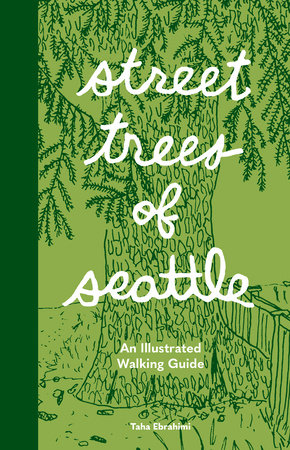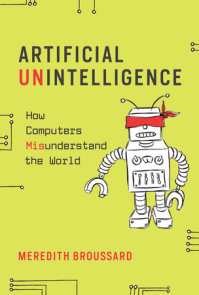

More than a Glitch
By Meredith Broussard
By Meredith Broussard
By Meredith Broussard
By Meredith Broussard
Category: Science & Technology
Category: Science & Technology

-
$23.95
Apr 02, 2024 | ISBN 9780262548328
-
Mar 14, 2023 | ISBN 9780262373067
YOU MAY ALSO LIKE

The Earth Transformed

Half-Earth Socialism

The Backyard Bird Chronicles

Juice

Cats: A Smithsonian Coloring Book

Chamber Divers

Natura Urbana

Street Trees of Seattle

The Conservative Environmentalist
Praise
Included in the FT‘s best summer books of 2023: Technology
Included in The Enterprisers Project’s “10 must-read tech books for 2023”
Included in the Next Big Idea Club’s “40 Nonfiction Books to Watch Out for in 2023″
Included in Ms. magazine’s “The Most Anticipated Feminist Books of 2023” list
Included in Glamour’s “The 15 Best Nonfiction Books of 2023, So Far”
“Telling the stories of individuals from marginalized communities who have been wronged by technology, the author shows how design and conceptual failures produce unfair outcomes…The stories enrage and drive home the cost of the failures and prejudices built into ostensibly cutting-edge programs. This sobering warning about the dangers of technology alarms and unsettles.”
–Publishers Weekly
“Broussard brings her perspective as a multiracial woman, data journalist, and computer scientist to an eye-opening critique of racism, sexism, and ableism in technology. She decries technochauvinism, which she defines as ‘a kind of bias that considers computational solutions to be superior to all other solutions’…An informed analysis of one of the insidious elements of technology.”
–Kirkus Reviews
“With her latest book, Meredith Broussard picks up on the threads of Safiya Noble and Ruha Benjamin as she demonstrates how technology reinforces injustice through its ubiquitous algorithms and questionable human interactions.”
–Ms.
“Meredith Broussard is not your usual AI scholar…what’s also notable about Broussard’s work on AI is that she has found ways to convey just how much AI has already infiltrated the lives of everyday people. In her latest book, More than a Glitch, for instance, she writes about various tangible examples that bring to light the very significant and at times problematic ways AI is already affecting various facets of people’s lived experience, whether it be soap dispensers that do not recognize darker skin tones or the AI technology that told her she had cancer. And this book is not just for Big Tech developers or professors who debate the ethical implications of AI. Her book is written for people of all tech-literacy levels. You can tell Broussard is a teacher as well as a scholar; she’s not afraid to explain some of the most obscure issues in plain words.”
–TheMarkup
“People like to think of technology as a neutral force, but the truth is that racism, sexism, and ableism are often coded right into the tech systems we use every day (like how facial recognition technology is primed to work on lighter skin, or how mortgage-approval algorithms lead to discriminatory lending). It’s an important topic in an increasingly tech-reliant world, and More Than a Glitch is a great place to start learning about it.”
–Cosmopolitan
“Broussard, a researcher and reporter whose work focuses on ethics in AI, is the perfect guide to this moment. She brings transparency, analysis, and personal touches to a field that is kept intentionally opaque, in part so its creators can maintain its mystique.”
–Glamour
“Meredith Broussard is unusually well placed to dissect the ongoing hype around AI. She’s a data scientist and associate professor at New York University, and she’s been one of the leading researchers in the field of algorithmic bias for years. And though her own work leaves her buried in math problems, she’s spent the last few years thinking about problems that mathematics can’t solve. Her reflections have made their way into a new book about the future of AI. In More than a Glitch, Broussard argues that we are consistently too eager to apply artificial intelligence to social problems in inappropriate and damaging ways. Her central claim is that using technical tools to address social problems without considering race, gender, and ability can cause immense harm.”
–The MIT Technology Review
“Broussard’s book is distinguished by at least two elements: its extraordinarily expansive scope on the one hand, and its no-nonsense approach to both the problem and its solutions on the other…It is undeniably hard not to be overwhelmed by the seemingly unstoppable course of technological development in the contemporary world, especially around AI and everything it appears poised to reinvent. But cynicism can also be a hiding place for privilege, and those who say despairingly that nothing can be done are often those who stand to benefit most from nothing being done.”
–The Conversation
“As machine learning capabilities only continue to improve, finding more ethical – and therefore more equitable – solutions to programming is an increasing priority for tech companies and developers. Broussard’s book calls to mind the work of Anna Jean-Baptise, and points to an overall cultural focus on equity and inclusivity.”
–Forbes
“Why you should read it: You’re a tech leader who understands that there is always bias in modern technologies – you recognize the fallibility of humans – but you want to learn about potential solutions to this problem. Explore the frameworks that target specific demographics as “other” in the first place. This is essential reading for anyone invested in building a more equitable future.”
–The Enterprisers Project
“An artificial-intelligence (AI) ‘glitch’ is a problem neither expected nor consequential. Bias, by contrast, is baked in and disastrous, argues data scientist Meredith Broussard, one of very few Black women in this field, who focuses on AI and journalism.”
–Nature
“When technology reinforces inequality, it’s not just a glitch—it’s a signal that we need to redesign our systems to create a more equitable world.”
–The Next Big Idea Club
Table Of Contents
Table of Contents
1 Introduction 1
2 Understanding Machine Bias 11
3 Recognizing Bias in Facial Recognition 29
4 Machine Fairness and the Justice System 45
5 Real Students, Imaginary Grades 65
6 Ability and Technology 79
7 Gender Rights and Databases 103
8 Diagnosing Racism 117
9 An AI Told Me I Had Cancer 135
10 Creating Public Interest Technology 157
11 Potential Reboot 173
Acknowledgments 189
Notes 193
Bibliography 205
Index 223
21 Books You’ve Been Meaning to Read
Just for joining you’ll get personalized recommendations on your dashboard daily and features only for members.
Find Out More Join Now Sign In













